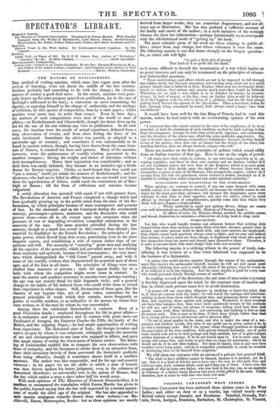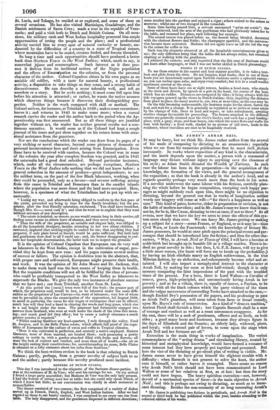COLONEL CAPADOSE'S WEST INDIES.
COLONEL CapAnoss has been stationed these sixteen years in the West Indies ; and, either on duty or as a tourist, has visited nearly every British colony except Jamaica and Honduras. Trinidad, Grenada, Tor. tots, Nevis, Antigua, Dominica, Barbadoes, St. Christopher, St. Vincent,
St. Lucia, and Tobago, he resided at or explored, and some of them on several occasions. He has also visited Martinique, Guadeloupe, and the Danish settlement of Santa Cruz; made a tour in the republic of Vene- zuela; and paid a visit both to Dutch and British Guiana. On all occa- sions, his military rank and West Indian hospitality procured him ample opportunities of seeing the people and the place; and a professional activity carried him to every spot of natural curiosity or beauty, un- daunted by the difficulties of a country in a state of Tropical nature, where mountains have to be scaled, streams forded, and forests threaded.
So long a time and such opportunities should have produced a better book than Sixteen Years is the West Indies; which, sooth to say, is somewhat jejune and commonplace. Such interest as it does pos- sess it derives from its incidental notices of the Negro population and the effects of Emancipation on the colonies, or from the personal character of the author. Colonel Capadose shines in his own pages as an amiable old soldier, with a taste for natural beauty, a professional activity, a disposition to take things as they come, and a strong habit of discursiveness. He can describe a scene tolerably well, and tell an anecdote or a story. But he seeks nothing; it must come full upon him before his attention is attracted ; or rather, he wants the native acumen which observes things because it discovers their distinguishing pro- perties. Neither is the work composed with skill or method. The Colonel arrives, for instance, at Trinidad, in 1839 ; makes some excursions: leaves it ; and returns in 1841 to make some more ; when a casual remark carries the reader and the author back to the period when the Ap- prenticeship was first announced. But as all these things are jumbled together without art, the reader has neither general results nor a con- tinuous narrative. It would seem as if the Colonel had kept a rough journal of his tours and put them together on his return home with occa- sional assistance from the gazetteer.
Nor are the conclusions which the reader can draw from its pages of a very striking or novel character, beyond some pictures of domestic or personal inconvenience here and there arising from Emancipation. Even these have to be received with caution, because the Colonel was in some Of the colonies the year after complete freedom was granted, and in 1841 the saturnalia had a good deal subsided. Beyond particular instances, which, under all the circumstances, are perhaps exceptions, Sixteen Years in the West Indies tells nothing that we did not know before : a general reduction in the amount of produce--great independence, to use the mildest term, on the part of the free Black labourers, working, when they could be persuaded, only as a favour—and severer suffering arising from this cause in Trinidad and Demerara than in the smaller islands where the population was more dense and the land more occupied. Here, however, is a specimen of what the Trinidadianq had to put up with oc- casionally. " Losing my way, and afterwards being obliged to conform to the foot-pace of the guide, prevented my being in time for the family breakfast; but the pro- prietor, after the first friendly salutation, exclaimed, ' You shall have breakfast, though Mrs. G— must cook it'; and then he went on to explain that they were without servants of any description.
" The estate is isolated; so remote, no one would remain long in their service; all finding some excuse to obtain leave of absence, and then never returning.
" Thus the wife of the proprietor, an amiable and elegant lady, was obliged to do all the household drudgery, besides attending to her two infant children. I entreated, implored that nothing might be cooked for me; that anything they had prepared, if only plain bread or biscuit, would be quite sufficient. But both lady and gentleman were deaf to all I could say; and, the former disappearing to exe- cute her hospitable determination, the latter took me to inspect the grounds."
It is the opinion of Colonel Capadose that Europeans can do very well as labourers in the West Indies, except in the cultivation of sugar, pro- vided they be kept from new rum : and his pages contain several notices of success or failure. The opinion is doubtless true in the abstract, that, with proper care and self-control, Europeans might preserve their health, and work. It was the opinion of Sir John Moore and Dr. Jackson, that to make them work hard was the best means of keeping them in health. But the requisite conditions will not all be fulfilled by the class of persons who could be profitably transported to the West Indies as labourers to supersede the Blacks. We give the only two instances of absolute success that we have met; one from Trinidad, another from St. Lucia. " At this period the [cocoa l trees were full of fine fruit; the greater part of which, the proprietor said, would be lost, as he laboured under the same diffi- culties as the proprietor of Las Cuevas—viz. want of labourers; very few of whom can be prevailed on, since the emancipation of the apprentices, 1st August 1838, to assist in gathering the cocoa for any wages or recompense ;hat can be offered; much less will they lend a hand in clearing the weeds and long grass, which rise to a sad height under the trees. The possessor had fortunately engaged two mowers from Scotland, who were at work under the shade of the trees this morn- ing; and much good did they effect; but to cause a radical clearance a much
greater number is required." s s s •
"Whilst making Soufriere my head-quarters, I rode through the valley, Fond St. Jacques, and to the Belle Plaine estate, which affords full proof of the cepa- bftity_ot Europeans for the culture of cocoa and coffee in Tropical climates. " Here it was cultivated in perfection, and scarcely a native employed. Sixteen Germans, most of them married, are located there; each possessing a pretty cottage to reside in, with a garden attached filled with fruits and flowers; all wore the look of content and comfort, and more than all of health,—the air on the height suiting their constitutions; for, notwithstanding its name, Belle Plaine is situated on a lofty eminence about ten miles from Soufriere."
We think the best-written section in the book is that relating to Dutch Guiana; partly, perhaps, from a greater novelty of subject both to us and the author; partly because this novelty produced more incident.
• DINNERS AT DUTCH GUIANA.
This day I was introduced to the etiquette of the Surinam dinner-parties. It was at theresidence of M. de Veer; who sent his carriage for me. On my arrival I found a large party assembled; but Madame de Veer was the only lady present. I had the honour of sitting next her at table: but she could only speak Dutch, of which I knew but little; so our conversation was chiefly in short sentences or monosyllables. The dinner consisted of two courses; the first comprised of a variety of dishes served up in French, Dutch, English, and West Indian fashion. After we had regaled on these to our hearts' content, I was surprised to see every one rise from table. The lady disappeared, and the gentlemen dispersed in different directions; some strolled into the gardens and enjoyed a cigar; others retired to the saloon to converse; whilst one or two lounged in the verandah.
Some time having passed thus, a servant announced "qu'on est servie"; the hostess reentered, took the arm of the gentleman who had previously taken her to the table, and resumed her place, each following her example.
The second course was placed before us, the dessert being blended, decorated with the choicest flowers and fruits; the champagne sparkled, and the conversa- tion became more animated. Madame did not again leave us till she led the way to the saloon for coffee or tea.
Such was the etiquette observed at all the hospitable entertainments given to me; the only difference being that the ladies did not always retire, but remained chatting or walking with the gentlemen. I admired the custom; and only regretted that the fair ones of Surinam would not learn other languages, or that I was not better skilled in Dutch phraseology.
TIDING IT IN DUTCH GUIANA.
To see these estates in the easiest and best manner possible, is to take a tent- boat and glide down the river. Do not imagine, kind reader, that in one of these boats you are luxuriously seated upon Turkish cushions under a splendid canopy: no, you can recline upon sofas, and enjoy every comfort; but it is in a small wooden apartment erected at the stern.
Some of these boats have six or eight rowers, besides a bead-man, who stands at the stern and directs, by speech or a pole in his hand, the course of the boat, which has no rudder. Distances are competed by tides; it being always with the tide voyagers proceed up the rivers in Dutch Guiana: thus, inquiring the distance from place to place, the usual answer is, one, two, or more tides, as the case may be. On the tide becoming unfavourable, boatmen make for the shore, fasten the boat and wait for a change. It is generally so regulated as to arrive at some estate by the change of tide, there to land and repose, or take refreshment, awaiting another change favourable for proceeding. The houses attached to the different estates are generally situated near the river's banks; and each has a good landing- place, with a quay, steps, and boat-house, into which the water flows and wafts the boat with facility: a level walk, shaded by an avenue of tall trees, leads to the residence, where travellers are sure to be hospitably received.



























 Previous page
Previous page